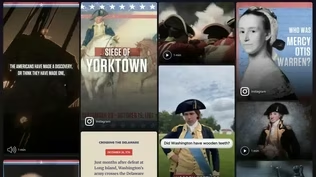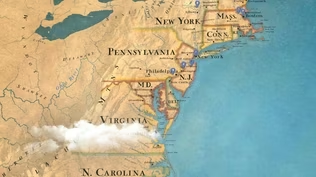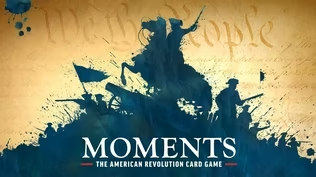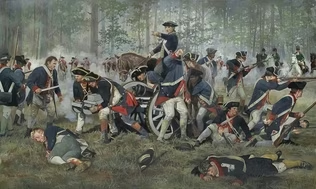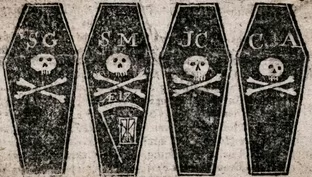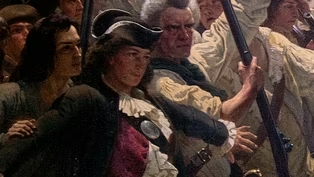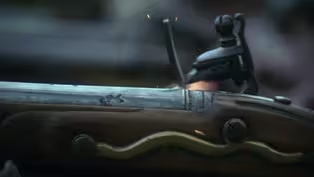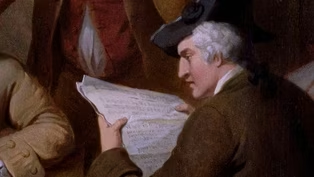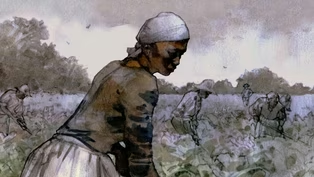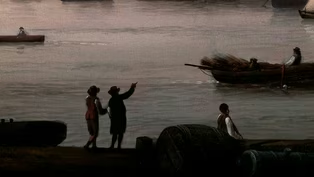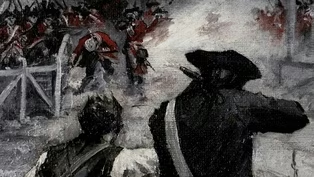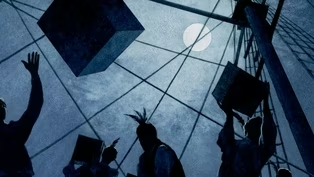
How the Townshend Acts Fueled a Resistance Movement
Clip: Episode 1 | 3m 11sVideo has Closed Captions
When the British imposed new taxes, women joined the Resistance Movement by the thousands.
In 1767, Parliament passed the Townshend Acts, which imposed new taxes on four items manufactured in England — glass, lead, paper, painter’s colors — along with tea, grown in China but re-exported from Britain. Women, who normally played a subordinate role in public life and had almost no legal rights, joined the resistance by the thousands as “Daughters of Liberty.”
Problems playing video? | Closed Captioning Feedback
Problems playing video? | Closed Captioning Feedback
Episodes presented in 4K UHD on supported devices. Corporate funding for THE AMERICAN REVOLUTION was provided by Bank of America. Major funding was provided by The Better Angels Society and...

How the Townshend Acts Fueled a Resistance Movement
Clip: Episode 1 | 3m 11sVideo has Closed Captions
In 1767, Parliament passed the Townshend Acts, which imposed new taxes on four items manufactured in England — glass, lead, paper, painter’s colors — along with tea, grown in China but re-exported from Britain. Women, who normally played a subordinate role in public life and had almost no legal rights, joined the resistance by the thousands as “Daughters of Liberty.”
Problems playing video? | Closed Captioning Feedback
How to Watch The American Revolution
The American Revolution is available to stream on pbs.org and the free PBS App, available on iPhone, Apple TV, Android TV, Android smartphones, Amazon Fire TV, Amazon Fire Tablet, Roku, Samsung Smart TV, and Vizio.
Buy Now
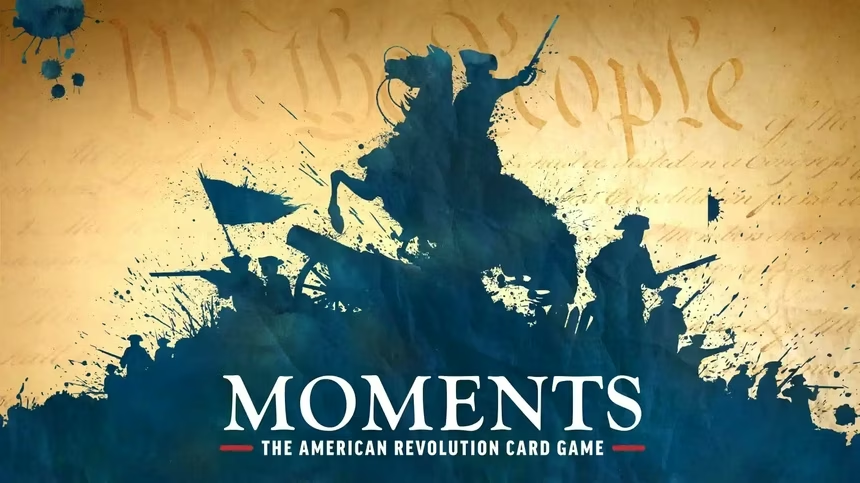
MOMENTS: The Revolutionary War Card Game
Use your knowledge of Revolutionary-era moments to build a timeline of real historical events.Providing Support for PBS.org
Learn Moreabout PBS online sponsorshipBeginning in the summer of 1767, the British government, still struggling with war debt, would win passage of 5 new laws--the Townshend Acts.
One of them especially angered colonists.
It imposed new taxes on 4 items manufactured in England-- glass, lead, paper, and painter's colors-- and on a fifth item, tea, grown in China but re-exported from Britain and loved by the colonists, rich and poor alike.
Newspaper editors and pamphleteers denounced the new taxes.
A revived and more militant Sons of Liberty called for a new boycott of British goods.
Women, who normally played a subordinate role in public life and had almost no legal rights, joined the resistance by the thousands as "Daughters of Liberty."
Woman: Crisis changes people.
And it gave women different ideas about what they should be doing.
DuVal: Women were the main consumers in colonial society and they were the ones who made sure the boycotts worked.
Women stopped drinking tea.
Women started making their own fabric.
Women started making toys for their children.
And they didn't just stop buying British things and start making their own things; they publicized it.
Taylor: One of the key forms of political theater during the Resistance Movement would be for a local minister to invite the women of the community to come down to the church and to spend the day spinning and weaving cloth.
And it would be a competition to see which community could produce the most homespun.
It would be published in the newspaper.
And these women would be praised as great American Patriots for having produced so much homespun cloth.
DuVal: And reporters would report, "The ladies of Boston, "The ladies of New York "are the most patriotic.
They are at the forefront of this protest movement."
If women hadn't done that, the protest movement and eventually the Revolution would have gone nowhere.
Voice: Let the Daughters of Liberty nobly arise, And though we've no voice but a negative here, Stand firmly resolved and bid them to see, That rather than freedom, we'll part with our tea.
Hannah Griffitts.
Voice: I wish to see America boast of Empire-- of Empire not established in the thralldom of nations but on a more equitable base.
Though such a happy state, such an equal government, may be considered by some as a Utopian dream; yet, you and I can easily conceive of nations and states under more liberal plans.
Mercy Otis Warren.
Video has Closed Captions
Clip: Ep1 | 7m 52s | A bloody clash between Bostonians and the British army leaves five dead in the Boston Massacre. (7m 52s)
Video has Closed Captions
Clip: Ep1 | 9m 39s | The American Revolution will be a war that will pit brother against brother – and birth a nation. (9m 39s)
Video has Closed Captions
Clip: Ep1 | 43s | A single shot echoes on Lexington Green, and the American Revolution begins. (43s)
Video has Closed Captions
Clip: Ep1 | 50s | A spark ignites—quiet, unstoppable. What follows changes everything. (50s)
How Land, Taxes and Rebellion Sparked the American Revolution
Video has Closed Captions
Clip: Ep1 | 7m 28s | The Stamp Act and taxes on American colonists lead to unrest and threaten to cause a revolution. (7m 28s)
Liberty for Whom? Slavery, Protest and the Ideals of the Revolution
Video has Closed Captions
Clip: Ep1 | 7m 32s | The revolutionary ideals of liberty spread across the colonies while many suffer from enslavement. (7m 32s)
Rising Tensions Didn't Keep European Settlers from Coming to North America
Video has Closed Captions
Clip: Ep1 | 2m 56s | Thousands poured down the Great Wagon Road, eager to start a new life in North America’s interior. (2m 56s)
The Shot Heard ’Round the World: Lexington, Concord and the Start of War
Video has Closed Captions
Clip: Ep1 | 11m 39s | Tensions erupt as colonists confront the British Army at Lexington and Concord, beginning the war. (11m 39s)
Tea, Tar and Tyranny: How the Boston Tea Party Changed Everything
Video has Closed Captions
Clip: Ep1 | 9m 26s | Bostonians protest the newly passed Tea Act by dumping 46 tons of tea into the Boston Harbor. (9m 26s)
Providing Support for PBS.org
Learn Moreabout PBS online sponsorshipSupport for PBS provided by:
Episodes presented in 4K UHD on supported devices. Corporate funding for THE AMERICAN REVOLUTION was provided by Bank of America. Major funding was provided by The Better Angels Society and...

